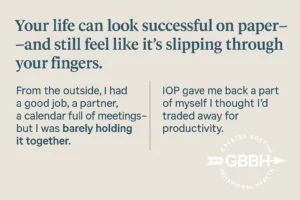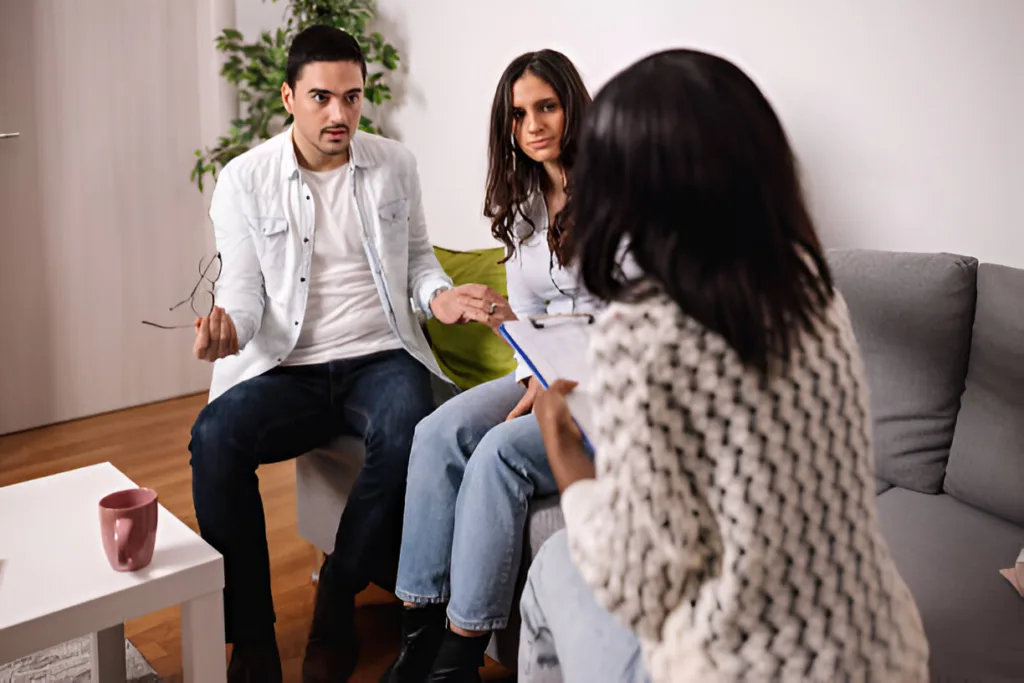Your life can look successful on paper—and still feel like it’s slipping through your fingers.
I used to think that as long as I showed up, stayed sharp, and kept it together on the outside, I was doing fine. But the truth was messier: I was performing success while quietly self-destructing. My nights blurred into a mix of booze, shame, and noise I couldn’t turn off. IOP didn’t just help me stop using—it gave me back the part of myself I thought I’d traded away for productivity.
If you’re looking for an IOP in Boston, MA that meets you where you are—without demanding you fall apart first—I want you to know this is possible. And it starts here.
I Was Holding It Together—And Falling Apart
From the outside? I had a good job. A partner. A calendar full of client meetings and birthday dinners. I even made it to the gym a few times a week. But I was barely holding it all together.
My substance use wasn’t wild or reckless—it was strategic. A few drinks after work to unwind, a pill here and there to sleep or get through social situations. Always just enough to keep the mask on. Never so much that anyone could accuse me of having a “problem.”
But I knew. I knew I was avoiding mirrors. I knew I wasn’t fully present for anything—not for people, not for myself. I didn’t feel joy, I felt pressure. Pressure to maintain, to hide, to not let anything crack through the surface.
The Wake-Up Call Was Subtle—But It Landed
I didn’t have a dramatic wake-up moment. No arrests, no overdose, no blown-up relationships. Just a question.
A colleague—someone I actually liked—asked if I was okay. Not in a fake, obligatory way. It was quiet and sincere: “You seem… tired. Like something’s weighing on you.”
That stuck with me. It wasn’t judgment. It was recognition. And for the first time in a long time, I let myself admit it: I wasn’t okay.
I searched for help that night. I wasn’t ready to upend my life—but I also couldn’t keep living like this. I found an Intensive Outpatient Program (IOP) near me. I didn’t know what to expect, but I showed up.

IOP Wasn’t a Step Down—It Was a Step In
There’s this myth that you have to fall apart before you’re allowed to ask for help. That if you haven’t burned your life down, you should just be grateful and keep grinding. I bought into that for years.
But IOP shattered that belief.
The structure was practical—three hours a day, a few times a week. It was made for people like me: still functional, still employed, but emotionally drowning. It didn’t require me to check out of life. It invited me to check back into it.
I wasn’t treated like a lost cause. I wasn’t told I had to start from scratch. I was given tools. I was seen.
I Didn’t Know I Was Allowed to Want Joy
One of the therapists asked me, early on: “What did you used to do that made you feel like you?”
I froze.
Not because I didn’t understand the question—but because I couldn’t remember the answer.
I hadn’t asked myself that in years. My whole world had been about getting through the day and avoiding collapse. Fun? Joy? Hobbies? Those were for people with space in their lives. I didn’t realize I’d squeezed all of mine out.
IOP didn’t hand me back those things—but it cleared out enough noise so I could hear the whisper: You’re allowed to want more than just coping.
I Picked Up a Guitar Again—And Didn’t Hate Myself for It
I used to play guitar. Not professionally. Not even particularly well. But I loved it. It was one of the few things that shut my brain up without numbing it. I hadn’t touched it in over five years.
One night after group, I walked past the case and opened it. Just like that. No ceremony. No big emotional surge. I played a few chords. My fingers were clumsy. My timing was off. But I wasn’t judging myself. I was just… there.
That’s when I knew something had shifted.
IOP hadn’t turned me into someone new. It helped me peel back the layers of performance and exhaustion until I could see the person I’d buried. Someone curious. Creative. Still messy—but alive.
Recovery Doesn’t End With Stopping—It Starts With Reclaiming
Getting sober—or cutting back, or getting honest about your habits—is only the beginning. What comes after that is the part no one talks about: rebuilding.
Rebuilding doesn’t mean becoming a different person. It means getting reacquainted with who you are when you’re not numbing, avoiding, or disappearing.
For me, that meant revisiting things I’d written off as “past life” material. Music. Cooking for fun, not obligation. Even long walks through my own neighborhood without earbuds blaring in my head—just me, noticing things again.
That kind of presence isn’t flashy. But it’s everything.
The Group Room Gave Me Something I Didn’t Know I Needed
Here’s something I didn’t expect: the people in IOP weren’t all that different from me. Some were managing careers, others parenting, others still figuring it out. But the common thread wasn’t chaos—it was exhaustion.
We were all tired of pretending we were fine.
There’s power in sitting across from someone who says the thing you thought only lived in your head. The group room became a mirror I didn’t hate. It showed me I wasn’t the only one lying to themselves in broad daylight.
And from that mirror, I started seeing possibilities again—not just problems.
If you’re in that place—barely managing but scared to stop performing—know that IOP isn’t just for crises. It’s also for quiet reclamations. If you’re nearby, IOP in Dedham, MA could be exactly the doorway you need.
IOP Gave Me Back a Future I Actually Want
This isn’t a glossy “before and after.” I still have rough days. I still get the urge to disconnect. But I don’t do it on autopilot anymore. I have awareness. I have tools. I have choice.
Most importantly—I have things I want to show up for.
That might sound simple. But when you’ve spent years hiding in plain sight, the ability to want again is everything.
IOP helped me access that—not by fixing me, but by helping me remember what I care about.
FAQs About IOP and the High-Functioning Experience
What is IOP, and how does it differ from inpatient treatment?
IOP stands for Intensive Outpatient Program. It’s a structured form of treatment that allows you to live at home and continue with work or school while attending therapeutic sessions several days a week. Unlike inpatient treatment, which requires full-time commitment and residency, IOP provides flexibility without compromising depth of care.
Can I attend IOP if I’m still working full-time?
Yes. Many IOP programs, including those at Greater Boston Behavioral Health, are designed specifically for people who are still working or going to school. Sessions often happen in the morning or evening to accommodate a typical workday.
Is IOP only for people with severe addiction?
Not at all. IOP is appropriate for people at various stages of substance use or mental health recovery—including those who are high-functioning but internally struggling. You do not need to “hit bottom” to qualify for help.
How long does an IOP last?
Program length can vary depending on your needs and progress, but most IOPs last between 6–12 weeks. The schedule typically includes multiple sessions per week, usually lasting around 3 hours each.
What kind of therapy is included in IOP?
IOP generally includes a combination of group therapy, individual therapy, psychoeducation, relapse prevention, and sometimes family therapy. The focus is on both practical skills and deeper emotional work.
Will other people in the program be like me?
More than you might expect. Many IOP participants are professionals, parents, students—people juggling responsibilities while quietly struggling. You may find, like I did, that you’re not alone in the way you’ve been coping.
Ready to reconnect with what matters?
Call (888) 450-3097 or visit our IOP program in Boston, Massachusetts to see how recovery can start without rock bottom.

